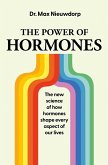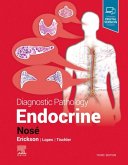Shlomo Melmed (Professor of Medicine, Dean of the Medical Faculty,, Ronald Koenig, Clifford J. Rosen (Tufts University School o Professor of Medicine
Williams Textbook of Endocrinology
Shlomo Melmed (Professor of Medicine, Dean of the Medical Faculty,, Ronald Koenig, Clifford J. Rosen (Tufts University School o Professor of Medicine
Williams Textbook of Endocrinology
- Gebundenes Buch
- Merkliste
- Auf die Merkliste
- Bewerten Bewerten
- Teilen
- Produkt teilen
- Produkterinnerung
- Produkterinnerung
Expertly bridging the gap between basic science and clinical information, Williams Textbook of Endocrinology, 14th Edition, brings together an outstanding collection of world-renowned authors to provide authoritative discussions of the full spectrum of adult and pediatric endocrine system disorders. New chapters and significant revisions throughout keep you up to date with recent advances in medications, therapies, clinical trials, and more. This essential reference is a must-have resource for endocrinologists, endocrine surgeons, gynecologists, internists, pediatricians, and other clinicians…mehr
Andere Kunden interessierten sich auch für
![Williams Textbook of Endocrinology Williams Textbook of Endocrinology]() Williams Textbook of Endocrinology199,99 €
Williams Textbook of Endocrinology199,99 €![Women, Food, and Hormones Women, Food, and Hormones]() Sara GottfriedWomen, Food, and Hormones44,99 €
Sara GottfriedWomen, Food, and Hormones44,99 €![The Power of Hormones The Power of Hormones]() Max NieuwdorpThe Power of Hormones27,99 €
Max NieuwdorpThe Power of Hormones27,99 €![Women, Food, and Hormones Women, Food, and Hormones]() Sara GottfriedWomen, Food, and Hormones23,99 €
Sara GottfriedWomen, Food, and Hormones23,99 €![Healing the Thyroid with Ayurveda Healing the Thyroid with Ayurveda]() Marianne TeitelbaumHealing the Thyroid with Ayurveda16,99 €
Marianne TeitelbaumHealing the Thyroid with Ayurveda16,99 €![Diagnostic Pathology: Endocrine Diagnostic Pathology: Endocrine]() Nose, Vania, MD, PhD (Vania Nose, MD, PhD, Professor of Pathology, HDiagnostic Pathology: Endocrine251,99 €
Nose, Vania, MD, PhD (Vania Nose, MD, PhD, Professor of Pathology, HDiagnostic Pathology: Endocrine251,99 €![Endocrine Secrets Endocrine Secrets]() Michael T. McDermott (Denver School of Medi University of ColoradoEndocrine Secrets41,99 €
Michael T. McDermott (Denver School of Medi University of ColoradoEndocrine Secrets41,99 €-
-
-
Expertly bridging the gap between basic science and clinical information, Williams Textbook of Endocrinology, 14th Edition, brings together an outstanding collection of world-renowned authors to provide authoritative discussions of the full spectrum of adult and pediatric endocrine system disorders. New chapters and significant revisions throughout keep you up to date with recent advances in medications, therapies, clinical trials, and more. This essential reference is a must-have resource for endocrinologists, endocrine surgeons, gynecologists, internists, pediatricians, and other clinicians who need current, comprehensive coverage of this multifaceted field.
Hinweis: Dieser Artikel kann nur an eine deutsche Lieferadresse ausgeliefert werden.
Hinweis: Dieser Artikel kann nur an eine deutsche Lieferadresse ausgeliefert werden.
Produktdetails
- Produktdetails
- Verlag: Elsevier - Health Sciences Division
- Artikelnr. des Verlages: C2016-0-05412-8
- 14 ed
- Seitenzahl: 1792
- Erscheinungstermin: Januar 2020
- Englisch
- Abmessung: 284mm x 226mm x 58mm
- Gewicht: 3860g
- ISBN-13: 9780323555968
- ISBN-10: 0323555969
- Artikelnr.: 57909610
- Herstellerkennzeichnung
- Elsevier LTD
- 125 London Wall
- EC2Y 5AS London, GB
- germany.elsevier.com
- 0044 1865844645
- Verlag: Elsevier - Health Sciences Division
- Artikelnr. des Verlages: C2016-0-05412-8
- 14 ed
- Seitenzahl: 1792
- Erscheinungstermin: Januar 2020
- Englisch
- Abmessung: 284mm x 226mm x 58mm
- Gewicht: 3860g
- ISBN-13: 9780323555968
- ISBN-10: 0323555969
- Artikelnr.: 57909610
- Herstellerkennzeichnung
- Elsevier LTD
- 125 London Wall
- EC2Y 5AS London, GB
- germany.elsevier.com
- 0044 1865844645
Shlomo Melmed, MB, ChB, FRCP, MACP, is Executive VP and Dean of the Medical Faculty at Cedars-Sinai Medical Center. He leads Cedars-Sinai's research and education programs, recruiting nationally recognized faculty leadership, establishing new educational programs and maintaining the highest academic standards. Dr. Melmed holds the Helene A. and Philip E. Hixon Distinguished Chair in Investigative Medicine. An international authority on pituitary medicine, he has pioneered the discovery and application of novel treatments for endocrine tumors and has authored more than 350 peer-reviewed articles. Dr. Melmed has been a faculty leader at Cedars-Sinai for nearly 40 years and has been the health system's chief academic officer since 1998. Dr. Melmed's laboratory consistently has received competitive grant awards from the National Institutes of Health since 1980, and he has trained over 80 physicians, scientists and graduate students who occupy leading positions in academic endocrinology worldwide. He is on the editorial board of the Journal of Clinical Investigation and is also an Associate Dean of the UCLA School of Medicine.
Section I: HORMONES AND HORMONE ACTION
1. Principles of Endocrinology
2. Principles of Hormone Action
3. Genetics of Endocrinology
4. Laboratory Techniques for Recognition of Endocrine Disorders
5. The Global Burden of Endocrine Disease
6. Navigating Through Clinical Practice Guidelines in Endocrinology
Section II: HYPOTHALAMUS AND PITUITARY
7. Neuroendocrinology
8. Pituitary Physiology and Diagnostic Evaluation
9. Pituitary Masses and Tumors
10. Posterior Pituitary
Section III: THYROID
11. Thyroid Physiology and Diagnostic Evaluation
12. Hyperthyroid Disorders
13. Hypothyroidism and Thyroiditis
14. Nontoxic Diffuse Goiter, Nodular Thyroid Disorders, and Thyroid
Malignancies
Section IV: ADRENAL CORTEX AND ENDOCRINE HYPERTENSION
15. The Adrenal Cortex
16. Endocrine Hypertension
Section V: SEXUAL DEVELOPMENT AND FUNCTION
17. Physiology and Pathology of the Female Reproductive Axis
18. Hormonal Contraception
19. Testicular Disorders
20. Sexual Dysfunction in Men and Women
21. Transgender Endocrinology
Section VI: ENDOCRINOLOGY AND THE LIFE SPAN
Section VI A: Maternal-Fetal
22. Endocrine Changes in Pregnancy
23. Endocrinology of Fetal Development
Section VI B: Childhood
24. Disorders of Sex Development
25. Normal and Aberrant Growth in Children
26. Physiology and Disorders of Puberty
Section VI C: Adult
27. Hormones and Athletic Performance
28. Endocrinology and Aging
Section VII: MINERAL METABOLISM
29. Hormones and Disorders of Mineral Metabolism
30. Osteoporosis: Basic and Clinical Aspects
31. Rickets and Osteomalacia
32. Kidney Stones
Section VIII: DISORDERS OF CARBOHYDRATE AND FAT METABOLISM
33. Physiology of Insulin Secretion
34. Pathophysiology of Type 2 Diabetes Mellitus
35. Therapeutics of Type 2 Diabetes Mellitus
36. Type 1 Diabetes Mellitus
37. Complications of Diabetes Mellitus
38. Hypoglycemia
39. Neuroendocrine Control of Energy Stores
40. Obesity
41. Disorders of Lipid Metabolism
Section IX: POLYENDOCRINE AND NEOPLASTIC DISORDERS
42. Multiple Endocrine Neoplasia
43. The Immunoendocrinopathy Syndromes
44. Endocrinology of HIV/AIDS
45. Neuroendocrine Tumors
46. Endocrinology of Cancer Survivors
1. Principles of Endocrinology
2. Principles of Hormone Action
3. Genetics of Endocrinology
4. Laboratory Techniques for Recognition of Endocrine Disorders
5. The Global Burden of Endocrine Disease
6. Navigating Through Clinical Practice Guidelines in Endocrinology
Section II: HYPOTHALAMUS AND PITUITARY
7. Neuroendocrinology
8. Pituitary Physiology and Diagnostic Evaluation
9. Pituitary Masses and Tumors
10. Posterior Pituitary
Section III: THYROID
11. Thyroid Physiology and Diagnostic Evaluation
12. Hyperthyroid Disorders
13. Hypothyroidism and Thyroiditis
14. Nontoxic Diffuse Goiter, Nodular Thyroid Disorders, and Thyroid
Malignancies
Section IV: ADRENAL CORTEX AND ENDOCRINE HYPERTENSION
15. The Adrenal Cortex
16. Endocrine Hypertension
Section V: SEXUAL DEVELOPMENT AND FUNCTION
17. Physiology and Pathology of the Female Reproductive Axis
18. Hormonal Contraception
19. Testicular Disorders
20. Sexual Dysfunction in Men and Women
21. Transgender Endocrinology
Section VI: ENDOCRINOLOGY AND THE LIFE SPAN
Section VI A: Maternal-Fetal
22. Endocrine Changes in Pregnancy
23. Endocrinology of Fetal Development
Section VI B: Childhood
24. Disorders of Sex Development
25. Normal and Aberrant Growth in Children
26. Physiology and Disorders of Puberty
Section VI C: Adult
27. Hormones and Athletic Performance
28. Endocrinology and Aging
Section VII: MINERAL METABOLISM
29. Hormones and Disorders of Mineral Metabolism
30. Osteoporosis: Basic and Clinical Aspects
31. Rickets and Osteomalacia
32. Kidney Stones
Section VIII: DISORDERS OF CARBOHYDRATE AND FAT METABOLISM
33. Physiology of Insulin Secretion
34. Pathophysiology of Type 2 Diabetes Mellitus
35. Therapeutics of Type 2 Diabetes Mellitus
36. Type 1 Diabetes Mellitus
37. Complications of Diabetes Mellitus
38. Hypoglycemia
39. Neuroendocrine Control of Energy Stores
40. Obesity
41. Disorders of Lipid Metabolism
Section IX: POLYENDOCRINE AND NEOPLASTIC DISORDERS
42. Multiple Endocrine Neoplasia
43. The Immunoendocrinopathy Syndromes
44. Endocrinology of HIV/AIDS
45. Neuroendocrine Tumors
46. Endocrinology of Cancer Survivors
Section I: HORMONES AND HORMONE ACTION
1. Principles of Endocrinology
2. Principles of Hormone Action
3. Genetics of Endocrinology
4. Laboratory Techniques for Recognition of Endocrine Disorders
5. The Global Burden of Endocrine Disease
6. Navigating Through Clinical Practice Guidelines in Endocrinology
Section II: HYPOTHALAMUS AND PITUITARY
7. Neuroendocrinology
8. Pituitary Physiology and Diagnostic Evaluation
9. Pituitary Masses and Tumors
10. Posterior Pituitary
Section III: THYROID
11. Thyroid Physiology and Diagnostic Evaluation
12. Hyperthyroid Disorders
13. Hypothyroidism and Thyroiditis
14. Nontoxic Diffuse Goiter, Nodular Thyroid Disorders, and Thyroid
Malignancies
Section IV: ADRENAL CORTEX AND ENDOCRINE HYPERTENSION
15. The Adrenal Cortex
16. Endocrine Hypertension
Section V: SEXUAL DEVELOPMENT AND FUNCTION
17. Physiology and Pathology of the Female Reproductive Axis
18. Hormonal Contraception
19. Testicular Disorders
20. Sexual Dysfunction in Men and Women
21. Transgender Endocrinology
Section VI: ENDOCRINOLOGY AND THE LIFE SPAN
Section VI A: Maternal-Fetal
22. Endocrine Changes in Pregnancy
23. Endocrinology of Fetal Development
Section VI B: Childhood
24. Disorders of Sex Development
25. Normal and Aberrant Growth in Children
26. Physiology and Disorders of Puberty
Section VI C: Adult
27. Hormones and Athletic Performance
28. Endocrinology and Aging
Section VII: MINERAL METABOLISM
29. Hormones and Disorders of Mineral Metabolism
30. Osteoporosis: Basic and Clinical Aspects
31. Rickets and Osteomalacia
32. Kidney Stones
Section VIII: DISORDERS OF CARBOHYDRATE AND FAT METABOLISM
33. Physiology of Insulin Secretion
34. Pathophysiology of Type 2 Diabetes Mellitus
35. Therapeutics of Type 2 Diabetes Mellitus
36. Type 1 Diabetes Mellitus
37. Complications of Diabetes Mellitus
38. Hypoglycemia
39. Neuroendocrine Control of Energy Stores
40. Obesity
41. Disorders of Lipid Metabolism
Section IX: POLYENDOCRINE AND NEOPLASTIC DISORDERS
42. Multiple Endocrine Neoplasia
43. The Immunoendocrinopathy Syndromes
44. Endocrinology of HIV/AIDS
45. Neuroendocrine Tumors
46. Endocrinology of Cancer Survivors
1. Principles of Endocrinology
2. Principles of Hormone Action
3. Genetics of Endocrinology
4. Laboratory Techniques for Recognition of Endocrine Disorders
5. The Global Burden of Endocrine Disease
6. Navigating Through Clinical Practice Guidelines in Endocrinology
Section II: HYPOTHALAMUS AND PITUITARY
7. Neuroendocrinology
8. Pituitary Physiology and Diagnostic Evaluation
9. Pituitary Masses and Tumors
10. Posterior Pituitary
Section III: THYROID
11. Thyroid Physiology and Diagnostic Evaluation
12. Hyperthyroid Disorders
13. Hypothyroidism and Thyroiditis
14. Nontoxic Diffuse Goiter, Nodular Thyroid Disorders, and Thyroid
Malignancies
Section IV: ADRENAL CORTEX AND ENDOCRINE HYPERTENSION
15. The Adrenal Cortex
16. Endocrine Hypertension
Section V: SEXUAL DEVELOPMENT AND FUNCTION
17. Physiology and Pathology of the Female Reproductive Axis
18. Hormonal Contraception
19. Testicular Disorders
20. Sexual Dysfunction in Men and Women
21. Transgender Endocrinology
Section VI: ENDOCRINOLOGY AND THE LIFE SPAN
Section VI A: Maternal-Fetal
22. Endocrine Changes in Pregnancy
23. Endocrinology of Fetal Development
Section VI B: Childhood
24. Disorders of Sex Development
25. Normal and Aberrant Growth in Children
26. Physiology and Disorders of Puberty
Section VI C: Adult
27. Hormones and Athletic Performance
28. Endocrinology and Aging
Section VII: MINERAL METABOLISM
29. Hormones and Disorders of Mineral Metabolism
30. Osteoporosis: Basic and Clinical Aspects
31. Rickets and Osteomalacia
32. Kidney Stones
Section VIII: DISORDERS OF CARBOHYDRATE AND FAT METABOLISM
33. Physiology of Insulin Secretion
34. Pathophysiology of Type 2 Diabetes Mellitus
35. Therapeutics of Type 2 Diabetes Mellitus
36. Type 1 Diabetes Mellitus
37. Complications of Diabetes Mellitus
38. Hypoglycemia
39. Neuroendocrine Control of Energy Stores
40. Obesity
41. Disorders of Lipid Metabolism
Section IX: POLYENDOCRINE AND NEOPLASTIC DISORDERS
42. Multiple Endocrine Neoplasia
43. The Immunoendocrinopathy Syndromes
44. Endocrinology of HIV/AIDS
45. Neuroendocrine Tumors
46. Endocrinology of Cancer Survivors








